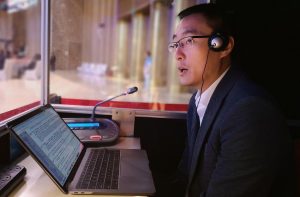Remote Interpreting for the 2020 Summer Olympic Games
By: Rony Gao Edited by: Fang Sheng
From the Editor: As the 2020 Summer Olympics concluded in Tokyo in 2021, and the 2022 Winter Olympics is fast approaching in Beijing, CLD member Rony Gao looks back on his experience as a remote interpreter for this world event.

On July 20th, 2021, three days before the opening ceremony of the Tokyo 2020 Summer Olympic Games, five hours drive to the North of Tokyo at Miyagi Stadium, a pre-match press conference for women’s football was underway. This was for the Group F match set to take place the next day between China and Brazil. Behind the scenes, two interpreters — one Chinese and one Portuguese — were getting ready online to provide consecutive interpretation for the coaches and players.
That Chinese interpreter was me. Personally, being the voice of the Chinese women’s football team at the most important sporting event in the world was a huge honor and a dream come true, because I grew up playing and watching football—no, not American football, but football, the sport that is commonly known as “soccer” only here in North America, not anywhere else. When receiving training for the Olympics interpretation assignment, we were told that there is no such thing as “soccer” in the Olympics lingo. “Always call it football,” the IOC chief interpreter stressed. “If you say soccer, a lot of people will be miffed.” That was when I began to appreciate how much nuance can go into the choice of a single word in the context of soccer — I mean, football.
Here are a few examples of football terminologies that, when interpreted between Chinese and English, may require some careful judgement on the part of the interpreter.
- 得分 can be either getting a point or scoring a goal, two confusingly similar concepts that actually mean very different things:
- 这场比赛打平,我们得到了一分。With this draw, we got one point (on the group standing table).
- 换人是为了加强进攻,争取破门得分。The substitution was meant to level up our offence, hoping to score a goal.
- 中场 may be either midfield or half-time, depending on whether it refers to time or space. In fact, the two may even appear in the same sentence:
- 所以中场休息的时候,我们对中场的人员做了调整。So we made some changes to our midfield lineup during half-time.
- You may think that 点球, the shot taken from 12 yards (11 meters) is a straight-forward one, but the English translation should be either penalty kick or penalty shootout, depending on the context:
- 凭借上半场的一粒点球,巴西队1:0小胜。Brazil secured a 1-0 (“one-nill”) victory with a penalty kick in the first half.
- 120分钟战平,双方通过点球大战才决出胜负。Following a draw after 120 minutes, the match had to be decided by penalty shootout.
If you don’t know football inside out, interpreting for a football press conference can feel like walking in a landmine field trying to steer clear of all the traps. For example, someone unfamiliar with the rules may have to learn that 加时 (overtime) and 补时 (stoppage time) are two different things.
In the end, my experience of interpreting for the Olympic Games this past summer was both exhilarating and humbling. The take-away is that, just as football is more about what you do outside of the 90 minutes, effective interpreting largely depends on the preparation that is done before kickoff. Doing your homework off the pitch is the best way to make sure that every shot will be on target—whether the shot is made with the ball or words.
Brilliant, Xiao Gao! Nice analogy!